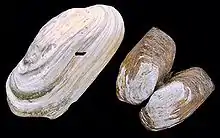| Hiatella arctica | |
|---|---|
 | |
| One whole shell with periostracum (right) and a single larger valve (left) of Hiatella arctica | |
| Scientific classification | |
| Domain: | Eukaryota |
| Kingdom: | Animalia |
| Phylum: | Mollusca |
| Class: | Bivalvia |
| Order: | Adapedonta |
| Family: | Hiatellidae |
| Genus: | Hiatella |
| Species: | H. arctica |
| Binomial name | |
| Hiatella arctica (Linnaeus, 1767) | |
| Synonyms[1] | |
Hiatella arctica, known as the wrinkled rock-borer, the arctic hiatella or the arctic saxicave, is a species of saltwater clam, a marine bivalve mollusc in the family Hiatellidae. The white shell of this mollusc is thick and more or less rectangular, but generally irregular in shape. It is up to 45 mm long.
Hiatella arctica is widespread and found in all the oceans, ranging from the Arctic and Antarctic to the subtropical and tropical zones. It occurs from the low water mark to depths of down to 800 m. It lives on hard substrates, often attached with byssus, for instance in mussel beds or nestling among kelp holdfasts, or hiding in rock crevices and also boring itself into soft rocks.
References
- ↑ Hatatella arctica (Linnaeus, 1767) WoRMS - World Register of Marine Species (2015)
- Hiatella arctica Archived 2010-08-09 at the Wayback Machine Marlin
- Hiatella arctica - Arctic hiatella sealifebase.org (Nov. 2015)
- Mollusca of the North Sea: Hiatella arctica Marine Species Identification Portal (Nov. 2015)
This article is issued from Wikipedia. The text is licensed under Creative Commons - Attribution - Sharealike. Additional terms may apply for the media files.